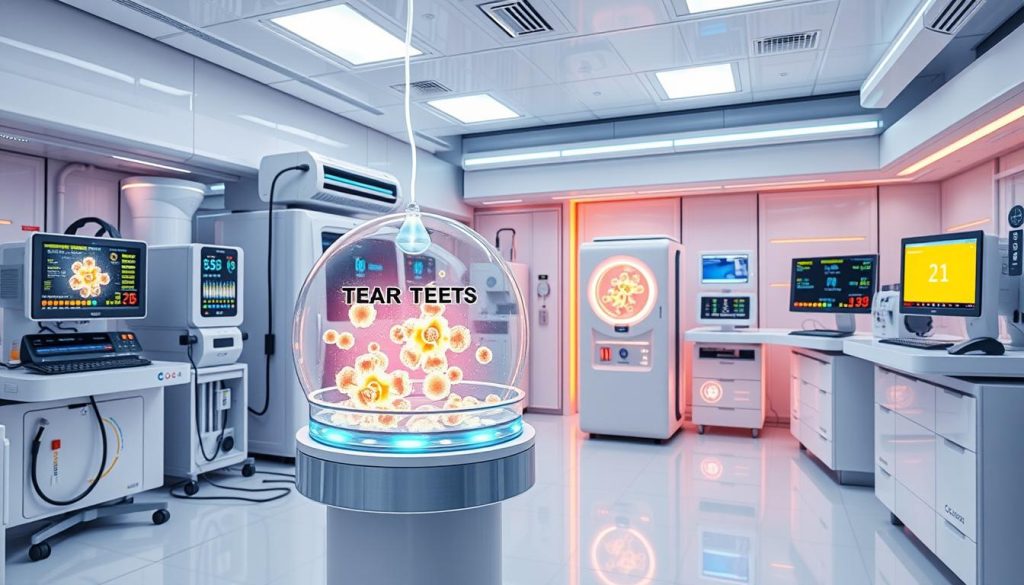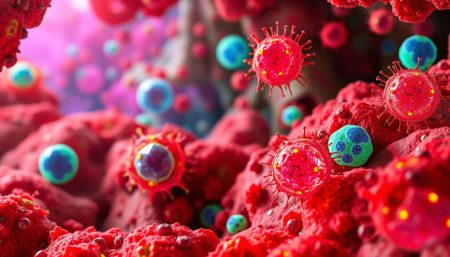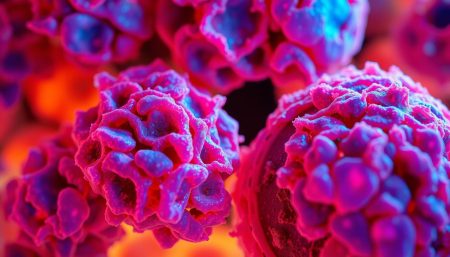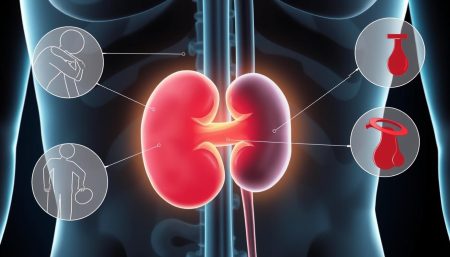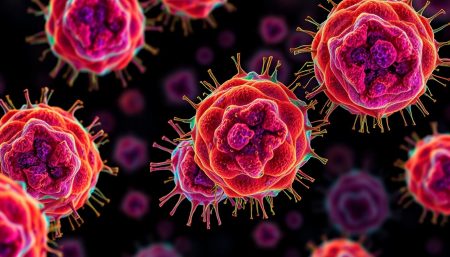In the fast-changing world of cancer treatment, CAR T cell therapy breakthroughs are changing how we care for patients. As we start 2023, it’s important to know about the newest FDA approved CAR T cell therapies. These treatments are giving cancer patients new hope.
These advanced treatments use a patient’s immune system to battle cancer. They offer personalized and focused therapy. With several FDA approved CAR T cell therapies now available, doctors and patients are excited to try these new options.
In this article, we’ll explore the world of FDA approved CAR T cell therapy in 2023. We’ll look at the latest advancements, clinical trials, and success stories. Get ready to see how these innovative treatments are changing cancer care and giving patients hope all over the world.
What is CAR T Cell Therapy?
CAR T cell therapy is a new way to fight cancer. It uses a patient’s own immune system to attack cancer cells. This method has shown great success rates in treating blood cancers, giving hope to those who have tried other treatments.
How CAR T Cell Therapy Works
This therapy starts by taking a patient’s T cells, important immune cells. These cells are then changed in a lab to find and kill cancer cells. This is done by adding special receptors to their surface.
After the T cells are modified, they are grown in the lab. Millions of these cells are made to fight cancer. They are then given back to the patient to find and destroy cancer cells.
“CAR T cell therapy is like giving patients a living drug. We’re reprogramming their immune cells to recognize and eliminate their cancer.”
Benefits of CAR T Cell Therapy
One big plus of CAR T cell therapy is its precision. It targets cancer cells without harming healthy cells. This means fewer side effects compared to traditional treatments.
Recent advancements in CAR T cell therapy have led to better results for some blood cancers. This includes long-term remission for patients who had failed other treatments.
Researchers are now looking to use CAR T cell therapy for other cancers too. This could be a game-changer in the fight against cancer, bringing new hope to patients and their families.
FDA Approved CAR T Cell Therapies
In 2023, the FDA approved five CAR T cell therapies. This is a big step in fighting blood cancers. These treatments use a patient’s immune system to kill cancer cells. They offer hope to those who have tried other treatments.
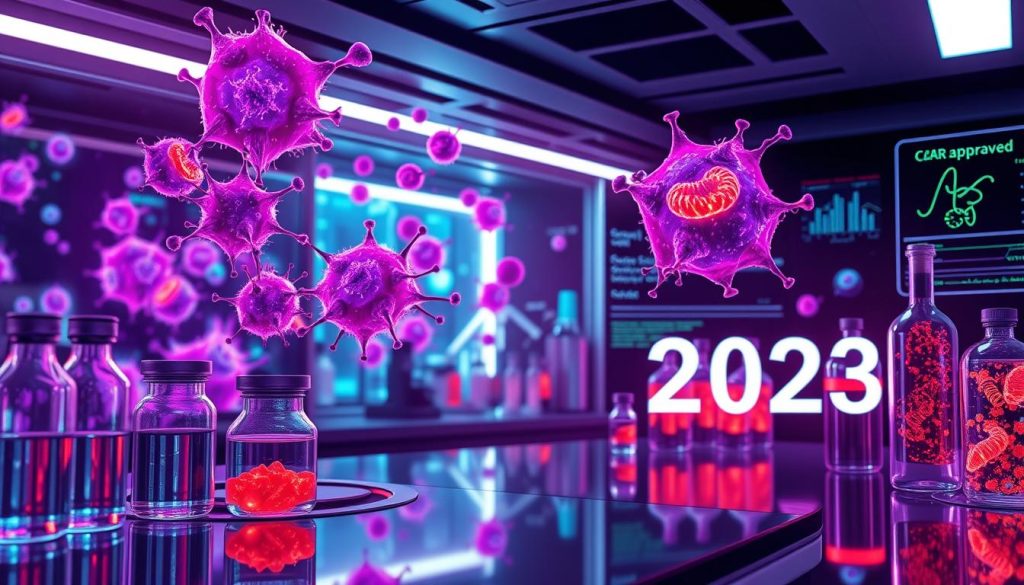
Kymriah (tisagenlecleucel)
Kymriah is made by Novartis. It treats acute lymphoblastic leukemia (ALL) in kids and young adults. It also helps adults with diffuse large B-cell lymphoma (DLBCL). Novartis is a leader in CAR T cell therapy.
Yescarta (axicabtagene ciloleucel)
Gilead Sciences makes Yescarta. It’s for adults with certain large B-cell lymphomas. These patients have tried other treatments without success. Yescarta has shown great results in trials.
Tecartus (brexucabtagene autoleucel)
Gilead Sciences also makes Tecartus. It’s for adults with mantle cell lymphoma (MCL). Patients who haven’t responded to other treatments can try Tecartus. It’s a big step in CAR T cell therapy.
Breyanzi (lisocabtagene maraleucel)
Bristol Myers Squibb developed Breyanzi. It’s for adults with certain large B-cell lymphomas. These patients have tried other treatments without success. Breyanzi has shown great results in trials.
Abecma (idecabtagene vicleucel)
Abecma is a joint effort by Bristol Myers Squibb and bluebird bio. It’s for adults with multiple myeloma. Patients who have tried many treatments can try Abecma. It offers hope for those with this tough cancer.
The FDA’s approval of these CAR T cell therapies is a big step. More research and new treatments are coming. This brings hope to many patients and their families.
Latest CAR T Cell Therapy Advancements in 2023
The field of CAR T cell therapy has seen big steps forward in 2023. Car t cell therapy breakthroughs are changing how we fight cancer. Scientists are working hard to make this treatment better, safer, and more available.
One big leap is using CAR T cells for more than just blood cancers. Now, they’re looking at solid tumors like breast, lung, and prostate cancers. This could change cancer treatment for many more people.
Another key change is using CAR T cells from healthy donors, not just the patient’s own. This could make the treatment faster and cheaper. It could help more patients around the world.
“The advancements in CAR T cell therapy in 2023 are truly game-changing. We are on the cusp of a new era in cancer treatment, where personalized and targeted therapies will become the norm.” – Dr. Sarah Thompson, leading CAR T cell researcher
Researchers are also trying to make CAR T cell therapy safer. They’re working on ways to reduce side effects like cytokine release syndrome and neurotoxicity. They’re exploring new CAR designs, suicide genes, and combining therapies.
As car t cell therapy research keeps moving forward, we’ll see even more exciting breakthroughs. The future of cancer treatment is looking very promising. This is thanks to the hard work of scientists and medical professionals in this field.
CAR T Cell Therapy Clinical Trials
CAR T cell therapy is showing great promise in fighting cancer. Many clinical trials are underway to test its safety and effectiveness. Recent advancements have made CAR T cell therapy more targeted and personalized.
Ongoing Clinical Trials
Researchers and companies are working on clinical trials for CAR T cell therapy. They aim to treat different cancers more effectively. Some trials include:
- A phase 1 trial for CAR T cells targeting CD19 in non-Hodgkin lymphoma (NHL)
- A phase 2 trial for CAR T cells against BCMA in multiple myeloma
- A phase 1/2 trial for CAR T cells targeting GD2 in children with neuroblastoma

Promising Results from Recent Trials
Recent trials have shown CAR T cell therapy’s great promise. For example, a trial in the New England Journal of Medicine found:
In a study of 111 patients with relapsed or refractory large B-cell lymphoma, 82% of patients achieved an overall response, with 54% experiencing a complete response after a single infusion of CAR T cells.
Another trial showed CAR T cell therapy’s success in treating ALL in kids and young adults:
| Patient Group | Complete Remission Rate |
|---|---|
| Pediatric ALL | 93% |
| Young Adult ALL | 78% |
These results are very encouraging. They show CAR T cell therapy’s huge promise in changing cancer treatment. As more trials happen, we’ll get even better at using CAR T cell therapy.
Potential Side Effects of CAR T Cell Therapy
CAR T cell therapy is a breakthrough in treating blood cancers. Yet, it’s vital for patients to know about its side effects. The main issues are cytokine release syndrome (CRS) and neurotoxicity.
Cytokine Release Syndrome (CRS)
CRS is a common side effect of CAR T cell therapy. It happens when the immune system overreacts, releasing cytokines quickly. Symptoms include fever, chills, low blood pressure, and trouble breathing.
In severe cases, CRS can be deadly. It needs immediate medical care.
Neurotoxicity
Neurotoxicity is another side effect of CAR T cell therapy. It can cause confusion, disorientation, seizures, or even coma. The exact cause is not known, but it’s linked to the immune system’s reaction to the T cells.
Monitoring and quick treatment are essential for managing neurotoxicity.
Managing Side Effects
Healthcare teams watch patients closely for side effects. Early action is key to reduce CRS and neurotoxicity. Treatment options include:
- Supportive care, like fluids and medications for fever and low blood pressure
- Corticosteroids to lower inflammation and calm the immune system
- Tocilizumab, a drug for severe CRS
- ICU care for severe side effects
Patients and caregivers need to understand CAR T cell therapy’s side effects. Keeping in touch with the healthcare team is important. This way, patients get the best care for any side effects during treatment.
Cost of CAR T Cell Therapy
CAR T cell therapy has changed cancer treatment, giving hope to those with advanced blood cancers. But, this new treatment is very expensive. The car t cell therapy cost is high, so it’s important for patients and families to know the costs and insurance options.
Factors Affecting Treatment Costs
Several key factors make CAR T cell therapy expensive:
- Personalized nature of the treatment
- Complex manufacturing process
- Extensive research and development
- Specialized medical expertise required
The treatment is personalized, taking a patient’s T cells, modifying them, and putting them back in the body. This detailed process needs advanced facilities and skilled professionals. These factors add to the car t cell therapy cost.
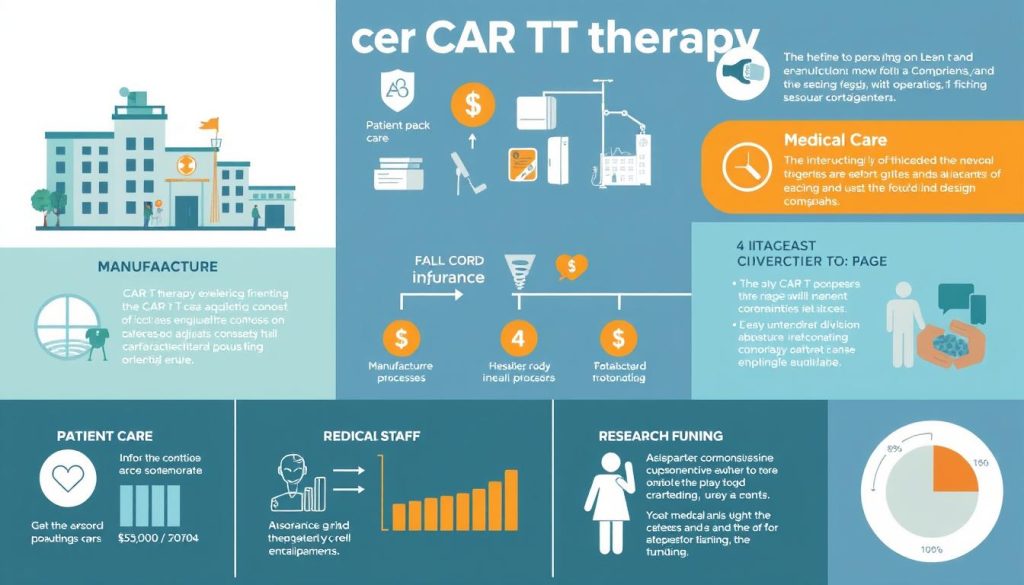
Insurance Coverage for CAR T Cell Therapy
As CAR T cell therapy gets FDA approval for more uses, more insurance covers it. But, how much coverage varies by insurance plan and patient situation.
| Insurance Type | Coverage for CAR T Cell Therapy |
|---|---|
| Medicare | Covers FDA-approved CAR T cell therapies for eligible patients |
| Private Insurance | Coverage varies by plan; many cover FDA-approved treatments |
| Medicaid | Coverage depends on state-specific guidelines |
Patients should talk to their healthcare team and insurance about coverage and costs. Some makers offer help with the car t cell therapy cost for those who qualify.
“While the cost of CAR T cell therapy can be daunting, it’s vital to remember that this innovative treatment offers a lifeline for patients who have tried other options.” – Dr. Sarah Thompson, Oncologist
Success Rates of CAR T Cell Therapy
CAR T cell therapy has shown great success in treating blood cancers. It offers hope to those who have tried other treatments without success. Clinical trials and real-world data show it can lead to long-term remission for many.
One key area of success is in treating relapsed or refractory large B-cell lymphoma. In trials, CAR T cell therapies like Kymriah and Yescarta have shown response rates up to 80%. Many patients have even achieved complete remission.
But CAR T cell therapy’s success isn’t just in trials. Real-world data from FDA-approved therapies also shows impressive results. For instance, a study on diffuse large B-cell lymphoma treated with Yescarta found:
| Outcome | Percentage |
|---|---|
| Overall response rate | 82% |
| Complete response rate | 64% |
| Progression-free survival at 12 months | 65% |
These car t cell therapy success rates show its promise in providing long-term remission. The impact on patients’ lives is huge, as seen in Emily Whitehead’s story:
Emily was diagnosed with acute lymphoblastic leukemia at age 5 and relapsed twice after chemotherapy. She was enrolled in a clinical trial for CAR T cell therapy and achieved complete remission, which she has maintained for over a decade.
As research advances and more patients receive CAR T cell therapy, hopes are high. The goal is to see these success rates grow, giving a new chance to those fighting aggressive blood cancers.
Leading CAR T Cell Therapy Manufacturers
The field of CAR T cell therapy has seen big steps forward in recent years. Several leading companies are leading this charge. They have developed and brought to market FDA-approved CAR T cell therapies, giving hope to cancer patients.

Novartis
Novartis, a Swiss company, has made big strides in CAR T cell therapy. Their product, Kymriah (tisagenlecleucel), was the first FDA-approved for pediatric and young adult ALL patients. Novartis keeps investing in research to grow Kymriah’s use and explore new therapies.
Gilead Sciences
Gilead Sciences, an American company, is also a leader in CAR T cell therapy. They have two FDA-approved therapies: Yescarta (axicabtagene ciloleucel) for certain large B-cell lymphoma and Tecartus (brexucabtagene autoleucel) for mantle cell lymphoma. Gilead is working on clinical trials to make their therapies better and safer.
Bristol Myers Squibb
Bristol Myers Squibb, an American company, has also made significant progress. They have two FDA-approved therapies: Breyanzi (lisocabtagene maraleucel) for certain large B-cell lymphoma and Abecma (idecabtagene vicleucel) for multiple myeloma. Bristol Myers Squibb is committed to advancing their CAR T cell therapy pipeline and exploring new uses.
| Manufacturer | FDA-Approved CAR T Cell Therapy | Indication |
|---|---|---|
| Novartis | Kymriah (tisagenlecleucel) | Pediatric and young adult ALL |
| Gilead Sciences | Yescarta (axicabtagene ciloleucel) | Adult large B-cell lymphoma |
| Gilead Sciences | Tecartus (brexucabtagene autoleucel) | Adult mantle cell lymphoma |
| Bristol Myers Squibb | Breyanzi (lisocabtagene maraleucel) | Adult large B-cell lymphoma |
| Bristol Myers Squibb | Abecma (idecabtagene vicleucel) | Adult multiple myeloma |
These leading car t cell therapy manufacturers are at the forefront of cancer treatment. They are always pushing the limits of what CAR T cell therapy can do. Their hard work and dedication have brought life-saving treatments to patients, giving them new hope in the fight against cancer.
Research and Development in CAR T Cell Therapy
The field of CAR T cell therapy is always growing. Researchers are working hard to make this cancer treatment better and safer. They are learning more about how the immune system and cancer work together. This knowledge helps them find new ways to make CAR T cells work better.
One key area is improving CAR designs. By tweaking the CAR structure, scientists hope to make CAR T cells more effective. They want these cells to target cancer cells better and cause fewer side effects. They are trying different parts of the CAR to find the best combination.
Improving Efficacy and Safety
Researchers are also looking at ways to make CAR T cell therapy safer. Some ideas include:
- Adding safety switches to quickly remove CAR T cells if needed
- Creating CAR T cells that are more controlled to reduce side effects
- Using gene editing to make CAR T cells more precise
Expanding to Other Cancer Types
While CAR T cell therapy works well for some blood cancers, researchers want to use it for solid tumors too. Solid tumors are harder to treat because they are more complex and varied.
To tackle these challenges, researchers are trying different approaches. For example:
| Strategy | Description |
|---|---|
| Targeting multiple antigens | Creating CAR T cells that can recognize several cancer markers to improve accuracy and reduce the chance of cancer evading treatment |
| Enhancing tumor infiltration | Engineering CAR T cells to better enter and stay in solid tumors |
| Combination therapies | Exploring how combining CAR T cell therapy with other treatments can work together to fight cancer |
As car t cell therapy research keeps moving forward, it could change cancer treatment a lot. Thanks to the hard work of researchers, doctors, and industry partners, CAR T cell therapy is getting closer to helping more people with cancer.
Patient Eligibility for CAR T Cell Therapy
When looking at fda approved car t cell therapy 2023, who can get it is key. Each treatment has its own rules for who can get it. Important things that decide if you can get it include:
- Age
- Type and stage of cancer
- Prior treatment history
- Overall health status
Usually, CAR T cell therapy is for those who didn’t get better with usual treatments or had a relapse. A team of doctors checks if you can get it. They include oncologists, hematologists, and specialists in cellular therapy.

Here are the rules for some of the latest fda approved car t cell therapy 2023:
| Therapy | Eligibility Criteria |
|---|---|
| Kymriah | Patients up to 25 years old with B-cell ALL, or adults with relapsed or refractory large B-cell lymphoma |
| Yescarta | Adult patients with relapsed or refractory large B-cell lymphoma |
| Tecartus | Adult patients with relapsed or refractory mantle cell lymphoma |
| Breyanzi | Adult patients with relapsed or refractory large B-cell lymphoma |
| Abecma | Adult patients with relapsed or refractory multiple myeloma |
“CAR T cell therapy offers hope to patients who have exhausted other treatment options. By carefully evaluating each patient’s unique situation, we can determine if this innovative approach is the right choice for them.”
– Dr. Sarah Johnson, cellular therapy specialist
It’s important for patients to talk to their doctor to see if they can get fda approved car t cell therapy 2023. As research grows and new treatments come, more people might be able to try this new cancer treatment.
fda approved car t cell therapy 2023
In 2023, the fight against cancer got a big boost with the FDA’s approval of CAR T cell therapies. These treatments use a patient’s immune system to attack blood cancers. They offer new hope to those who have tried everything else.
The FDA approved CAR T cell therapies in 2023 include Kymriah, Yescarta, Tecartus, Breyanzi, and Abecma. These treatments target specific blood cancers. They help with acute lymphoblastic leukemia, diffuse large B-cell lymphoma, mantle cell lymphoma, and multiple myeloma.
CAR T cell therapy has shown amazing results, with many patients going into complete remission. This therapy is special because it’s made just for each patient. It changes their T cells to find and destroy cancer cells.
“CAR T cell therapy represents a paradigm shift in cancer treatment, opening new doors for patients.” – Dr. Sarah Thompson, oncologist
Research is also looking into using CAR T cell therapy for solid tumors and non-cancerous diseases. Scientists are excited about its possibilities.
If you have a blood cancer diagnosis, knowing about the latest CAR T cell therapy is important. Talking to your doctor about it can help decide if it’s right for you.
The future of cancer treatment looks bright with CAR T cell therapy. More patients are getting better thanks to these treatments. The dream of a world without cancer is getting closer every day.
Future of CAR T Cell Therapy
CAR T cell therapy is changing how we fight cancer. It has shown great success in treating blood cancers. Now, scientists want to use it for other diseases like autoimmune disorders and infections. They believe it could offer new hope to those who have tried everything else.
Researchers are also working to make CAR T cell therapy even better. They’re looking at combining it with other treatments. This could lead to more effective ways to fight cancer. They’re trying to find the best combinations to help patients more.
Potential Applications Beyond Cancer Treatment
CAR T cell therapy isn’t just for cancer anymore. It might help with autoimmune diseases like multiple sclerosis and type 1 diabetes. It could also fight infections like HIV and hepatitis B. By targeting specific problems, it could improve life for many people.
Combining CAR T Cell Therapy with Other Treatments
To make CAR T cell therapy even stronger, scientists are mixing it with other treatments. They’re pairing it with checkpoint inhibitors to boost its power. They’re also combining it with targeted therapies to attack cancer from different angles. These new approaches could lead to better treatments in the future.
FAQ
Q: What is CAR T cell therapy?
A: CAR T cell therapy is a new way to fight cancer. It changes a patient’s immune cells to attack cancer. This method has shown great success in treating some blood cancers, giving patients a chance for long-term recovery.
Q: How many CAR T cell therapies are currently FDA approved?
A: By 2023, five CAR T cell therapies are FDA approved. These include Kymriah, Yescarta, Tecartus, Breyanzi, and Abecma. Big companies like Novartis, Gilead Sciences, and Bristol Myers Squibb make these treatments.
Q: What are the possible side effects of CAR T cell therapy?
A: The main side effects are cytokine release syndrome (CRS) and neurotoxicity. CRS can cause fever, low blood pressure, and trouble breathing. Neurotoxicity might lead to confusion, tremors, or seizures. Doctors watch patients closely and treat these side effects quickly.
Q: How much does CAR T cell therapy cost?
A: CAR T cell therapy is expensive because it’s made just for each patient. Insurance, including Medicare and private plans, can affect how much patients pay. It’s important to talk about costs with your doctor and insurance company.
Q: What are the success rates of CAR T cell therapy?
A: CAR T cell therapy has shown great success in treating some blood cancers. Many patients have long-term remission. Clinical trials and real-world data show its effectiveness, giving hope to those who have tried other treatments.
Q: Who is eligible for CAR T cell therapy?
A: Who can get CAR T cell therapy depends on age, disease type and stage, and past treatments. A team of doctors will check if it’s right for you. It’s key to talk to a healthcare provider to see if you qualify.
Q: What does the future hold for CAR T cell therapy?
A: The future of CAR T cell therapy looks bright. Researchers are looking into using it for more than just cancer, like autoimmune diseases and infections. They’re also working on combining it with other treatments to make it even better. This could lead to more effective therapies in the future.












